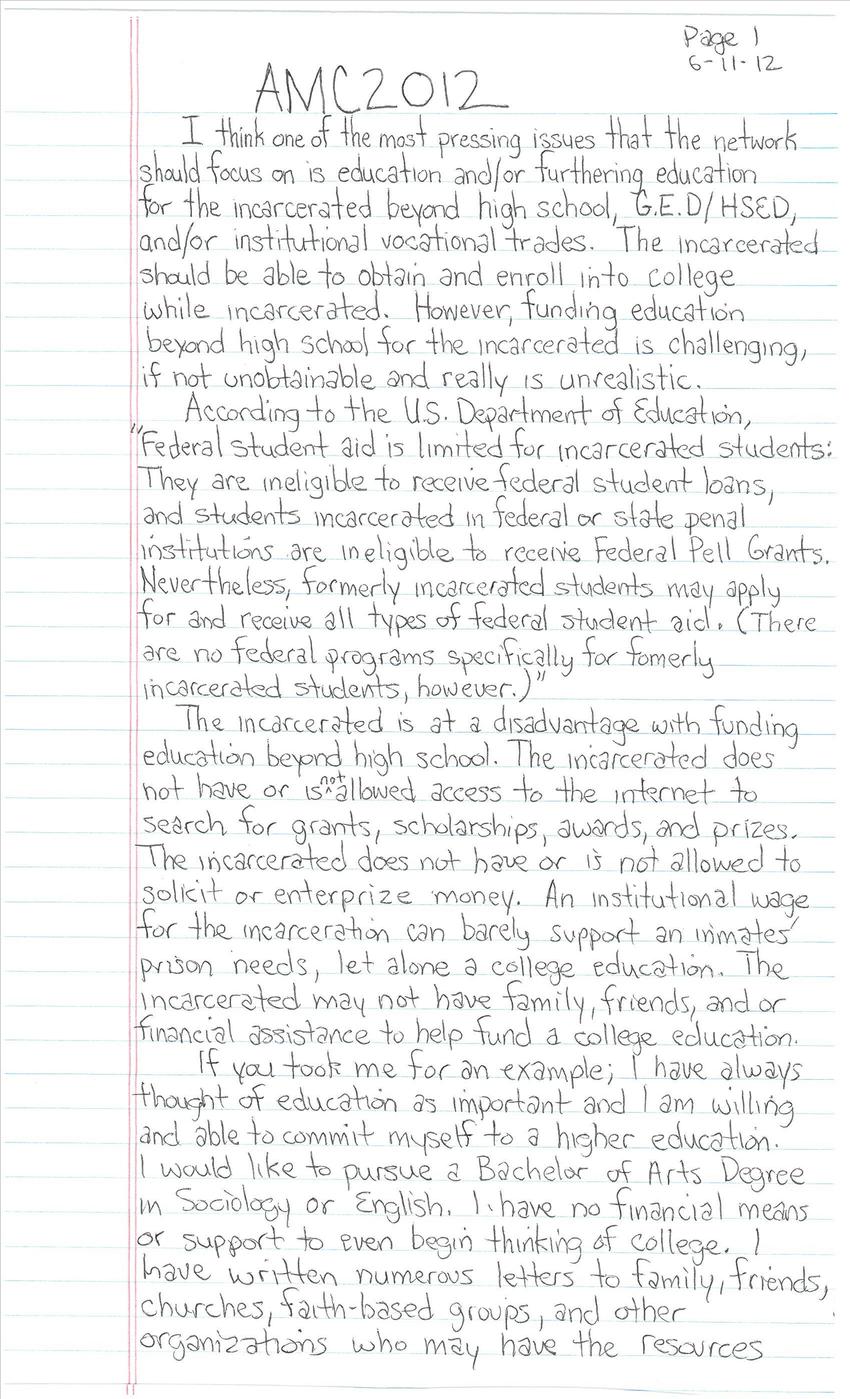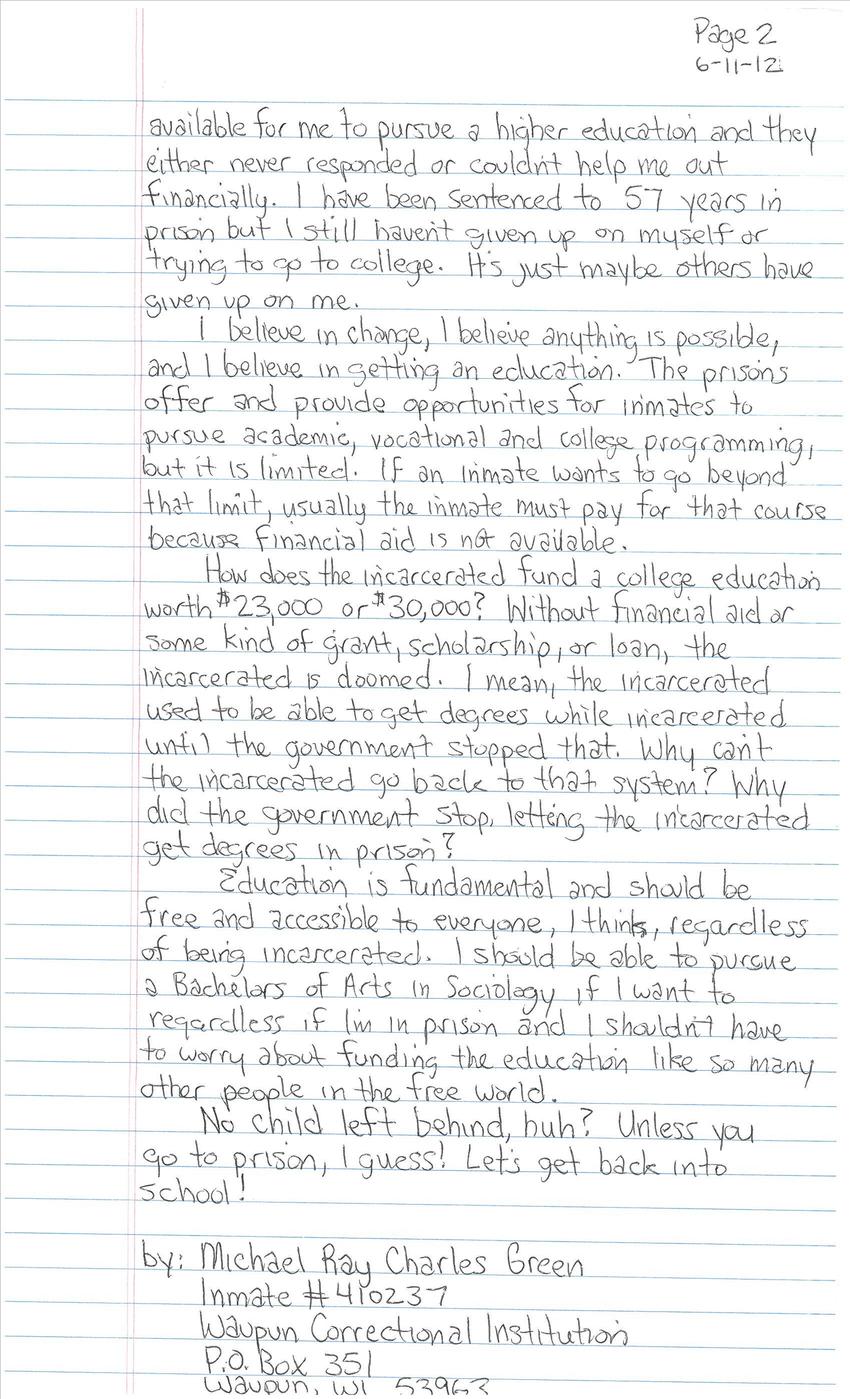
Transcription
6-11-12
AMC2012
I think one of the most pressing issues that the network should focus on is education and/or furthering education for the incarcerated beyond high school, G.E.D/HSED, and/or institutional vocational trades. The incarcerated should be able to obtain and enroll into college while incarcerated. However, funding education beyond high school for the incacerated is challenging, if not unobtainable and really isunrealistic.
According to the U.S Department of Education, "Federal student aid is limited for incarcerated students: They are ineligible to receive federal student loans, and students incarcerated in federal or state penal insitutions are ineligible to receive Federal Pell Grants. Neverthe less, formerly incarcerated students may apply for and receive all types of federal student aid. (There are no federal programs specifically for formerly incarcerated students however.)"
The incacerated is at a disadvantage with funding education beyond high school. The incarcerated does not have or is not allowed access to the internet to search for grants, scholarships, awards, and prizes. The incacerated does not have or is not allowed to solicit or enterprize money. an institutional wage for the incarceration can barely support an inmates prison needs, let alone a college education. The incarcerated may not have family, friends, and or financial assistance to help fund a college education.
if you took me for an example; I have always thought of education as important and I am willing an dable to commit myself to a higher education.
I would like to pursue a Batchelor of Arts Degree in Socialogy or English. I have no financial means or support to even begin thinking of college. I have written numerous letters to family, friends, churches, faith-based groups, and other organisations who may have the resources available for me to pursue a higher education and they either never responded otr couldn't help me out finacially. I have been sentenced to 57 years in prison but I still haven't given up on myself or trying to go to college. It's just maybe others have given up on me.
I believe in change, I believe anything is possible, and I believe in getting an education. The prison offer and provide opportunities for inmates to pursue academic, vocational and college programming, but it is limited. If an inmate wants to go beyond that limit, usually the inmate must pay for that course because financial aid is not available.
How does the incarcerated fund a college education worth $23,000 or $30,000? Without financial aid or some kind of giant, scholorship or loan, the incarcerated is doomed. I mean, the incarcerated used to be able to get degrees while incarcerated until the government stopped that. Why can't the incarcerated go back to that system? Why did the government stop letting the incacerated get degrees in prison?
Education is fundamental and should be free and accessible to everyone, I think, regardless of being incarcerated. I should be able to pursue a Batchelors of Arts in Soclology, if I want to regardless if I'm in prison and i shouldn't have to worry about funding the education like so many other people in the free world.
No child left behind, huh? Unless you go to prison, I guess! Let's get back into school!
by: Michael Ray Charles Green
Inmate #410237
Waupun Correctional Institution
P O Box 351
Waupun WI 53963
Other posts by this author
|
2017 jan 27

|
2012 dec 16

|
2012 oct 14

|
2012 aug 14

|
2012 aug 6

|
2012 may 27

|
More... |



Replies (3)
I'm in Charlie's workshop right now at the AMC. I did 14 years in Michigan prisons before getting out in 2008 and I totally agree with you about education. Because I did so long in the hole and didn't even have access to correspondence courses that you could pay for, I was determined to start preparing myself for the next chance I got at college by reading everything that I thought I had missed out on in high school. I went with literature, philosophy, and, eventually, some cultural studies stuff. It sounds like we may be interested in a lot of similar stuff.
When I got out and got back into school I started at community college with a major in criminal justice. I transferred over to the University of Michigan (Flint campus) and switched to a political science major (I was sick of being in class with future guards and cops). Looking back, I wish I would've went with English, sociology, or cultural studies. I feel like it would've been more important education.
That said, despite the barriers you face with getting a formal, recognized education, I strongly encourage you to keep reading good books. You might also consider writing to professors from the English or sociology departments from some universities.
You'd be surprised by the content of many classrooms, and please believe me when I say that personal reading that you do, especially if you're reading challenging stuff, thinking about it, and writing about it, is probably a much better education than you would get in a lot of college classrooms. The instructions, questions, and push you get from some professors is wonderful and helpful, but I don't know that you couldn't get that from simply writing to a random prof, explaining what you've read, and asking her to push you on the issue a little bit (or explaining).